Since Vice-Chancellor Erik Renström made the decision about Lund University’s five profile areas, a lot of work has been done. Thus far, most of it has not been visible from the outside, but this is about to change.
When, how and if the national call for profile areas will take place is still not clear. The budget bill provided no clear answers. On 22 November, the Association of Swedish Higher Education Institutions arranged a seminar called “Sharing experiences around the higher education institutions’ work on profile areas,” in which most universities participated. No one had any more information about the national call for profile areas than we do at Lund University. It was interesting to note that most higher education institutions had reached decisions about profile areas or had come a long way in the process of doing so. Another fascinating observation was that 25 of the 37 participants responded that “the process around the application has been useful regardless of whether it brings results” with the remaining ten replying that it was “good if something comes of it” or “only good if it ends up being a lot of money.” Only two participants considered the process a waste of time and resources.
During the autumn, a lot of discussions have taken place about how the profile areas are to be led and managed. These discussions resulted in 16 Vice-Chancellor’s decisions on 1 December. In these decisions, the regulations, board (Table 1) coordinator, deputy coordinator and one or more assistant coordinators (Table 2) for each profile area are approved.
Table 1. Boards for Lund University’s profile areas (will also include student representatives)
| Human Rights | Light and material | Naturlig och artificiell kognition | Proaktivt åldrande | Naturbaserade framtidslösningar | |
| EHL | Vicedekan Martin Blom | Prorektor Maria Stanfors | Vicerektor Ulf Johansson | ||
| HT | Prodekan Barbara Törnquist-Plewa | Dekan Johannes Persson (ordf.) | |||
| J | Dekan Eva Ryrstedt | Universitetslektor Lena Wahlberg | |||
| K | Dekan Sanimir Resic | Vicedekan Karin Johansson | Prodekan Staffan Storm | ||
| LTH | Rektor Annika Olsson (ordf.) | Prorektor Heiner Linke | Professor Per Runesson | Universitetslektor Per-Olof Hedvall | Prefekt Lars J. Nilsson |
| M | Vicedekan Heiko Herwald | Vicedekan Lena Eliasson (ordf.) | Vicedekan Karin Jirström | Prodekan Martin L. Olsson | Vicedekan Heiko Herwald |
| N | Professor Stacey Ristinmaa Sörensen | Universitetslektor Erik Wahlén | Professor Charlotta Turner | Professor Daniel Conley | |
| S | Prodekan Agnes Andersson-Djurfeldt | Dekan Christofer Edling, | Dekan Christofer Edling (ordf.) | Vicedekan Anna Meeuwisse (ordf.) | |
| MAX IV | Director Olof Karis | ||||
| Extern ledamot 1 | Vicerektor Rebecka Lettevall, Malmö universitet | VD Märta Lewander-Xu, Gasporox | Board Director Charlotta Falvin | Omsorgsdirektör Annika Andersson, Helsingborgs stad | Föreståndare Line Gordon, Stockholm Resilience Centre |
| Extern ledamot 2 | Direktör Morten Kjaerum, Raoul Wallenberg institutet | Research, Technology, and Business Executive Björn Ekelund, Ericsson Research | Business Development Manager Anna Hall, Alfa Laval | Chief Scientific Officer, Mikael Dolsten, Pfizer Inc. | Prefekt Julia Leventon, Global Change Research Institute, CAS |
Table 2. Coordinators, deputy and assistant coordinators for Lund University’s profile areas
| Mänskliga rättigheter | Ljus och material | Naturlig och artificiell kognition | Proaktivt åldrande | Naturbaserade framtids- lösningar | |
| Koordinator | professor Lena Halldenius (HT) | professor Tönu Pullerits (N) | professor Karl Åström (LTH) | professor Susanne Iwarsson (M) | professor Henrik Smith (N) |
| Ställföre-trädande koordinator | professor Jessica Almqvist (J) | professor Christelle Prinz (LTH) | professor Marianne Gullberg (HT) | professor Oskar Hansson (M) | professor Emily Boyd (S) |
| Biträdande koordinator | professor Jessica Almqvist (J) | professor Hanna Bäck (S) | professor Oskar Hansson (M) | professor Emily Boyd (S) | |
| Biträdande koordinator | professor Anette Agardh (M) | professor Melvyn B. Davies (N) | professor Hanna Isaksson (LTH) | universitetslektor Paul Miller (N) | |
| Biträdande koordinator | universitetslektor Martin Andersson (EHL) |
The profile areas have also been working on the foundations for communication and follow-up. Websites for each profile area will be published soon. From the start of next year, following the development of the profile areas will be easier once the profile areas’ members have been entered into a hub of their own in LUCAT. This is in order to link the profile areas’ research results with the research information system LUCRIS, and to enable publication on the University’s research portal. Measures to facilitate following up of the finance system have also been taken. From the beginning of 2023, we will be able to systematically follow what the profile areas produce, and we will have channels through which to share this information.
När, hur och om den nationella utlysningen om profilområden kommer är fortfarande oklart. Budgetpropositionen gav inget tydligt svar. Den 22 november ordnade Sveriges universitets- och högskoleförbund (SUHF) ett seminarium “Erfarenhetsutbyte kring lärosätenas arbete med profilområden“ där de flesta universiteten och högskolorna deltog. Ingen hade då mera information om den nationella utlysningen än vad vi har på Lunds universitet. Intressant var att de flesta lärosätena hade fattat beslut om profilområden, eller hade kommit långt i processen med att ta fram profilområden. En annan fascinerande iakttagelse var att 25 av de 37 deltagarna svarade att ”processen kring ansökan har varit nyttig oavsett om det blir något” och av de övriga svarade 10 att det var ”bra om det genomförs” eller ”bra bara om det blir mycket pengar”. Bara två deltagare ansåg att det varit slöseri med tid och resurser.
Profilområden: på Lunds universitet är det verkstad, från regeringen är det tyst
Sedan rektor Erik Renström fattade beslut om Lunds universitets fem profilområden har mycket arbete gjorts. Hittills har det mesta inte synts utåt, men detta kommer snart att ändras.
Under hösten har många diskussioner förts om hur profilområdena ska styras och förvaltas. Dessa diskussioner resulterade i sexton rektorsbeslut den första december. I dessa rektorsbeslut fastställs varje profilområdes föreskrifter, styrelse (tabell 1) koordinator, ställföreträdande koordinator och en eller flera biträdande koordinatorer (tabell 2).
Tabell 1. Styrelserna för Lunds universitets profilområden (studentrepresentanter kommer också att ingå)
| Mänskliga rättigheter | Ljus och material | Naturlig och artificiell kognition | Proaktivt åldrande | Naturbaserade framtidslösningar | |
| EHL | Vicedekan Martin Blom | Prorektor Maria Stanfors | Vicerektor Ulf Johansson | ||
| HT | Prodekan Barbara Törnquist-Plewa | Dekan Johannes Persson (ordf.) | |||
| J | Dekan Eva Ryrstedt | Universitetslektor Lena Wahlberg | |||
| K | Dekan Sanimir Resic | Vicedekan Karin Johansson | Prodekan Staffan Storm | ||
| LTH | Rektor Annika Olsson (ordf.) | Prorektor Heiner Linke | Professor Per Runesson | Universitetslektor Per-Olof Hedvall | Prefekt Lars J. Nilsson |
| M | Vicedekan Heiko Herwald | Vicedekan Lena Eliasson (ordf.) | Vicedekan Karin Jirström | Prodekan Martin L. Olsson | Vicedekan Heiko Herwald |
| N | Professor Stacey Ristinmaa Sörensen | Universitetslektor Erik Wahlén | Professor Charlotta Turner | Professor Daniel Conley | |
| S | Prodekan Agnes Andersson-Djurfeldt | Dekan Christofer Edling, | Dekan Christofer Edling (ordf.) | Vicedekan Anna Meeuwisse (ordf.) | |
| MAX IV | Direktör Olof Karis | ||||
| Extern ledamot 1 | Vicerektor Rebecka Lettevall, Malmö universitet | VD Märta Lewander-Xu, Gasporox | Board Director Charlotta Falvin | Omsorgsdirektör Annika Andersson, Helsingborgs stad | Föreståndare Line Gordon, Stockholm Resilience Centre |
| Extern ledamot 2 | Direktör Morten Kjaerum, Raoul Wallenberg institutet | Research, Technology, and Business Executive Björn Ekelund, Ericsson Research | Business Development Manager Anna Hall, Alfa Laval | Chief Scientific Officer, Mikael Dolsten, Pfizer Inc. | Prefekt Julia Leventon, Global Change Research Institute, CAS |
Tabell 2. Koordinatorer, ställföreträdande och biträdande koordinatorer för Lunds universitets profilområden
| Mänskliga rättigheter | Ljus och material | Naturlig och artificiell kognition | Proaktivt åldrande | Naturbaserade framtids- lösningar | |
| Koordinator | professor Lena Halldenius (HT) | professor Tönu Pullerits (N) | professor Karl Åström (LTH) | professor Susanne Iwarsson (M) | professor Henrik Smith (N) |
| Ställföre-trädande koordinator | professor Jessica Almqvist (J) | professor Christelle Prinz (LTH) | professor Marianne Gullberg (HT) | professor Oskar Hansson (M) | professor Emily Boyd (S) |
| Biträdande koordinator | professor Jessica Almqvist (J) | professor Hanna Bäck (S) | professor Oskar Hansson (M) | professor Emily Boyd (S) | |
| Biträdande koordinator | professor Anette Agardh (M) | professor Melvyn B. Davies (N) | professor Hanna Isaksson (LTH) | universitetslektor Paul Miller (N) | |
| Biträdande koordinator | universitetslektor Martin Andersson (EHL) |
Profilområdena har också arbetat med att lägga grunden för kommunikation och uppföljning. Inom kort kommer webbsidor för varje profilområde att publiceras på lu.se.
Från och med årsskiftet blir det enklare att följa profilområdenas utveckling, då ska profilområdenas medlemmar ha lagts in i en egen nod i LUCAT. Detta för att kunna koppla forskningsresultaten till profilområdena i forskningsinformationssystemet LUCRIS och möjliggöra publicering av vad profilområdena åstadkommit i universitetets forskningsportal. Åtgärder för uppföljning i ekonomisystemet har också vidtagits. Från och med början av 2023 kommer vi att systematiskt kunna följa vad profilområdena producerar och vi kommer att ha kanaler för att dela denna information.


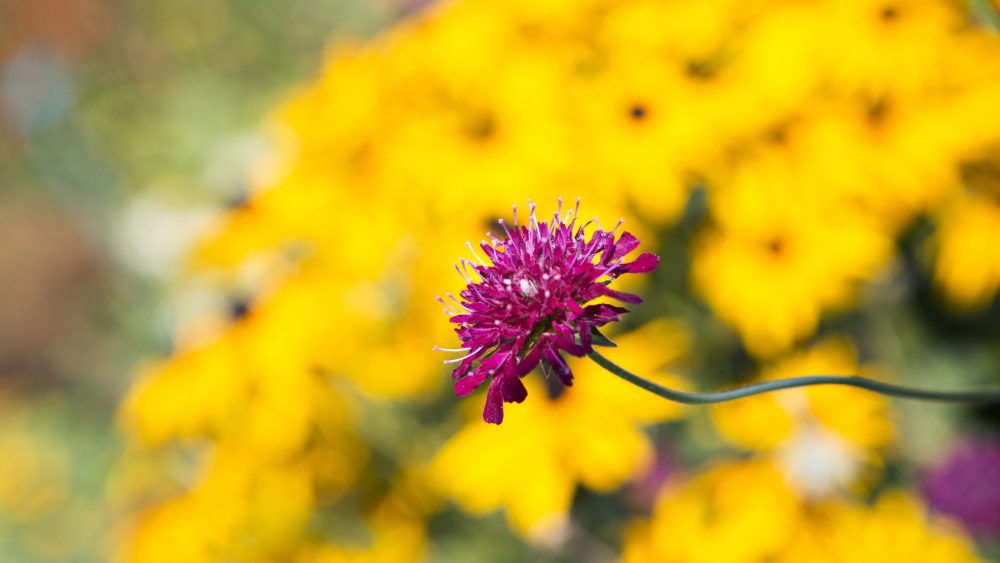
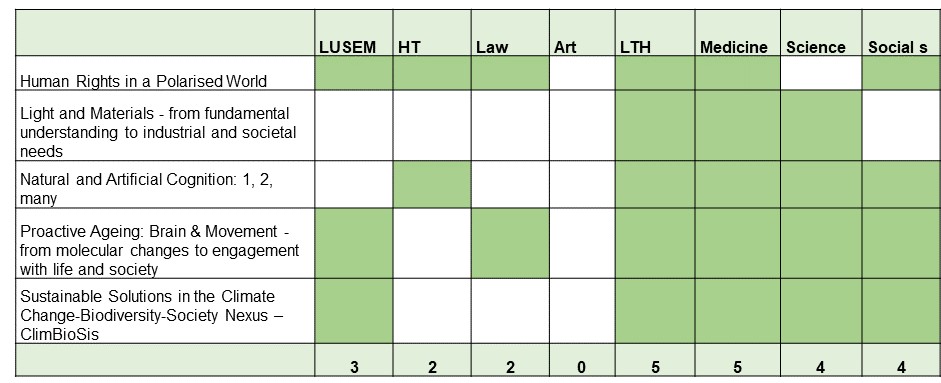

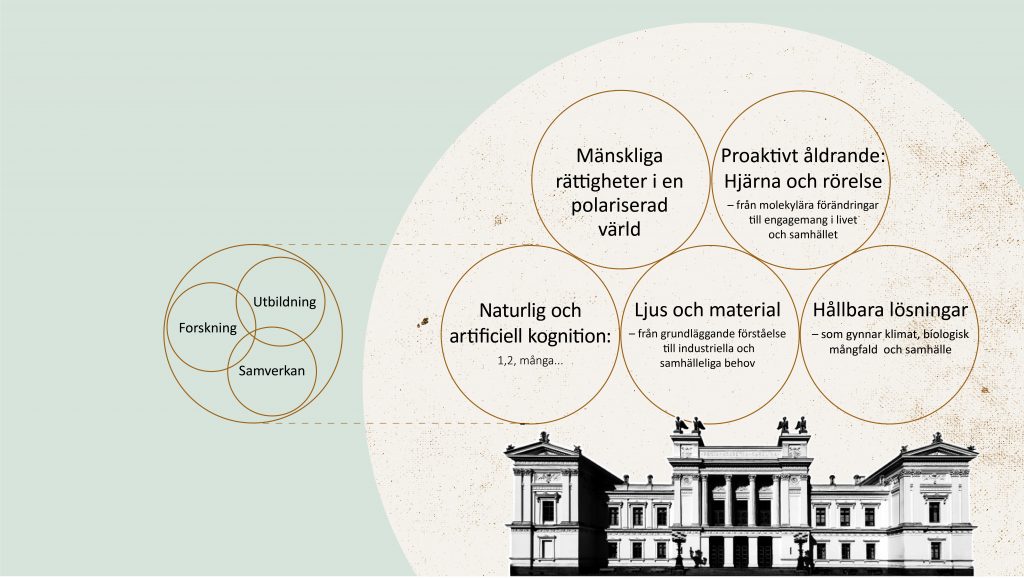
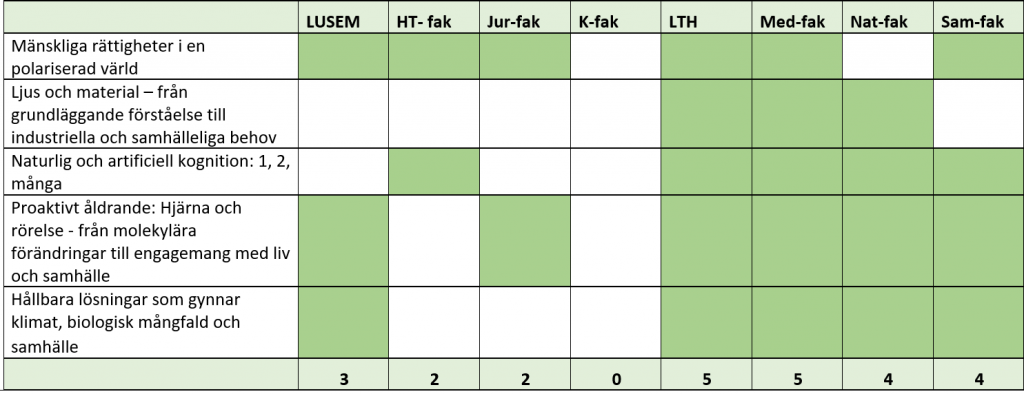
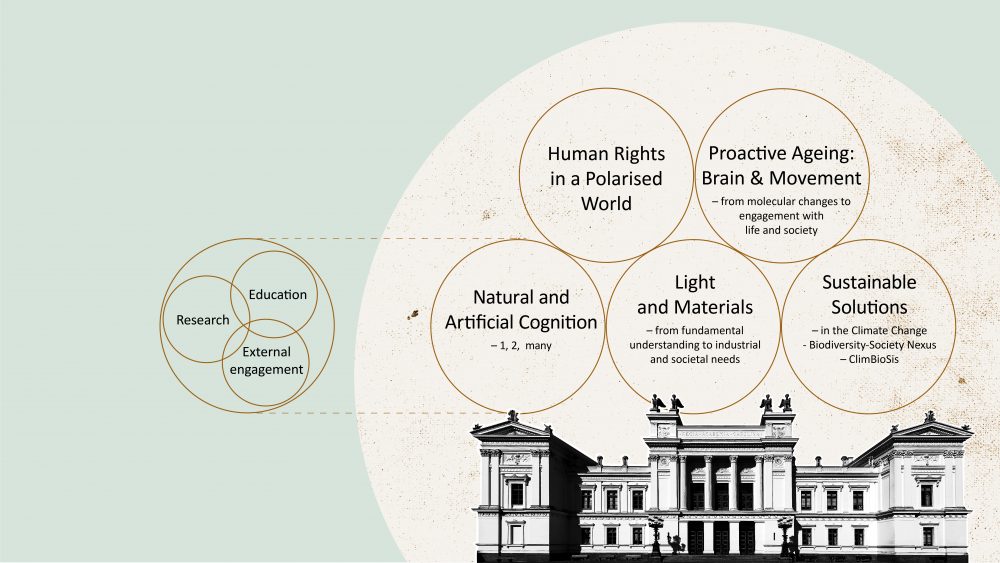

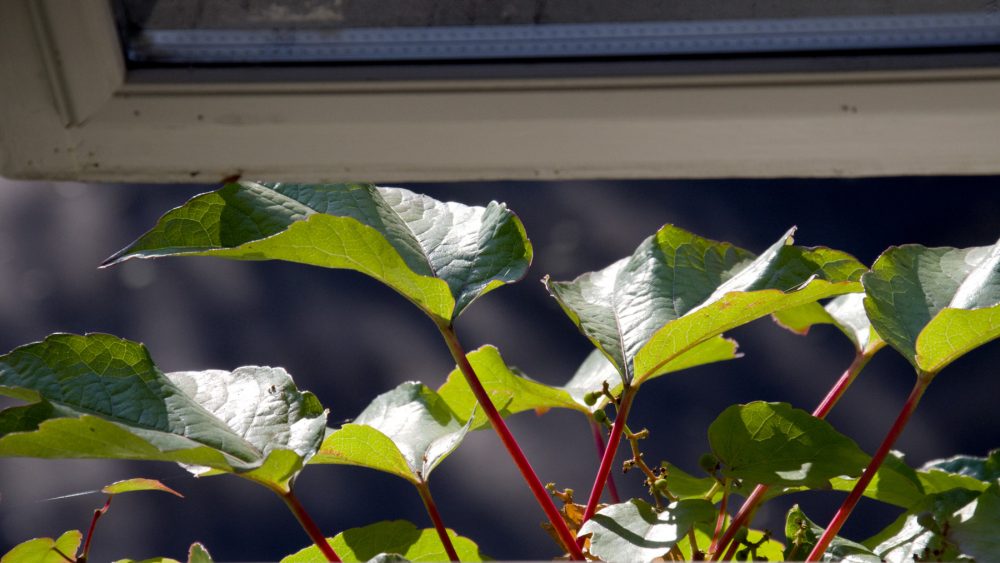
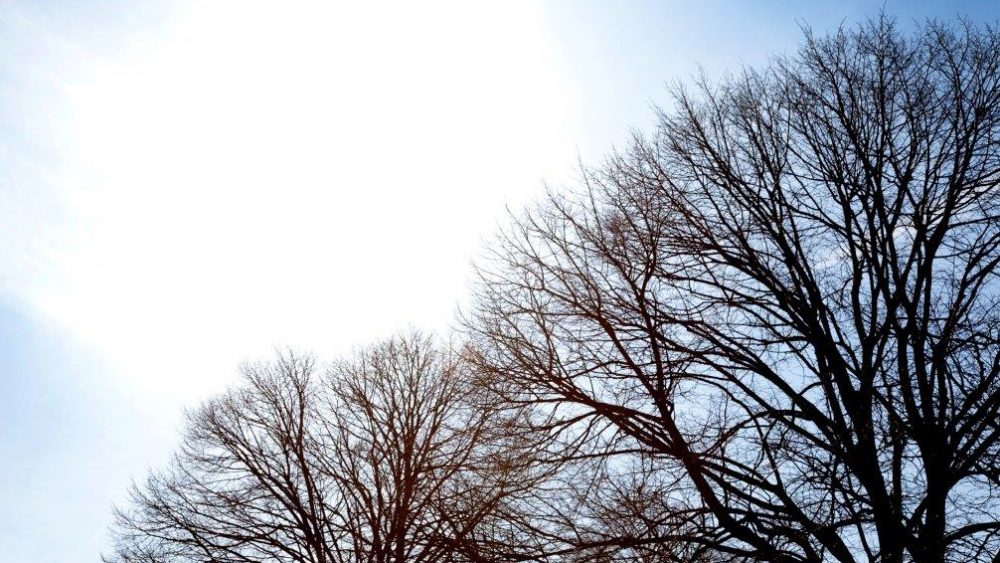

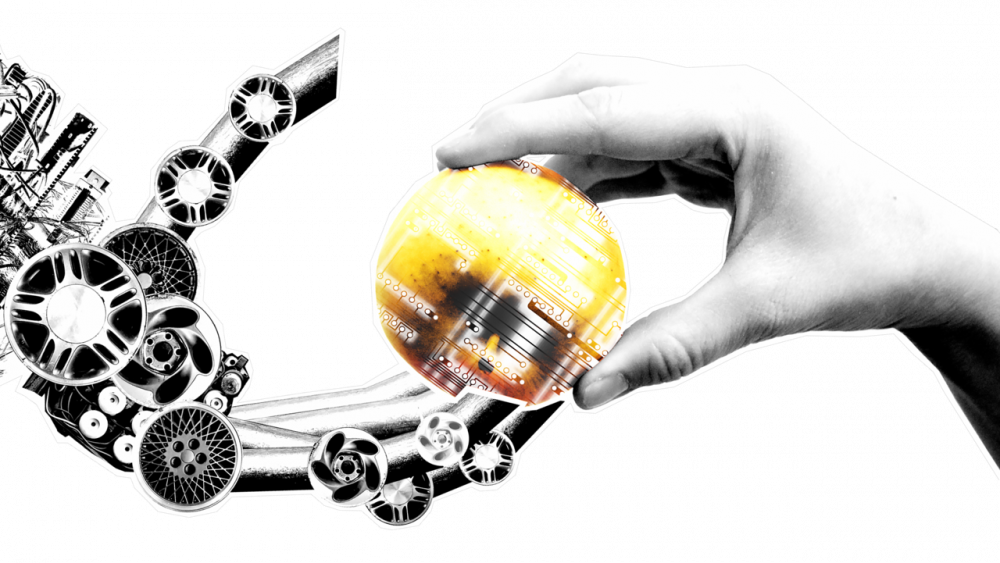
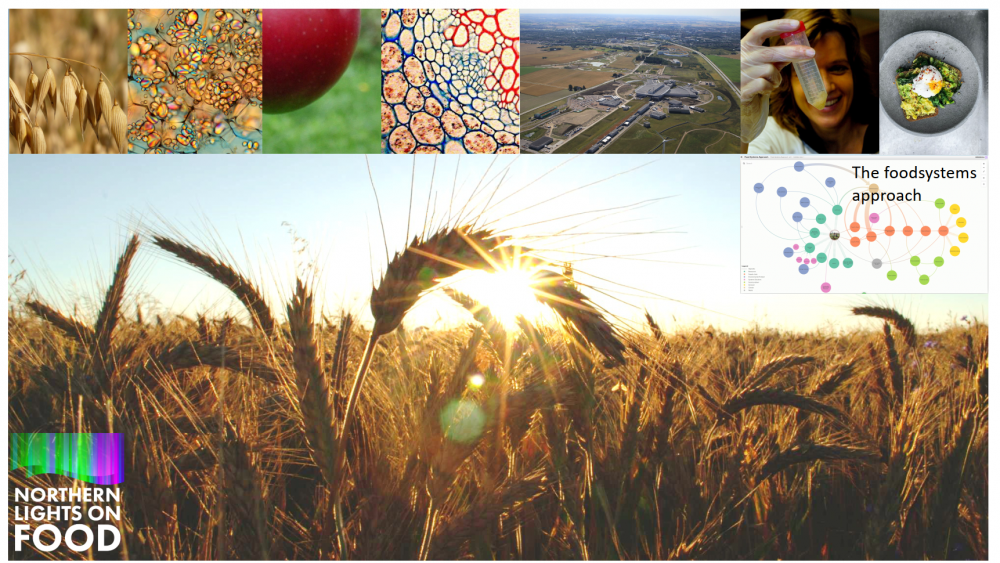

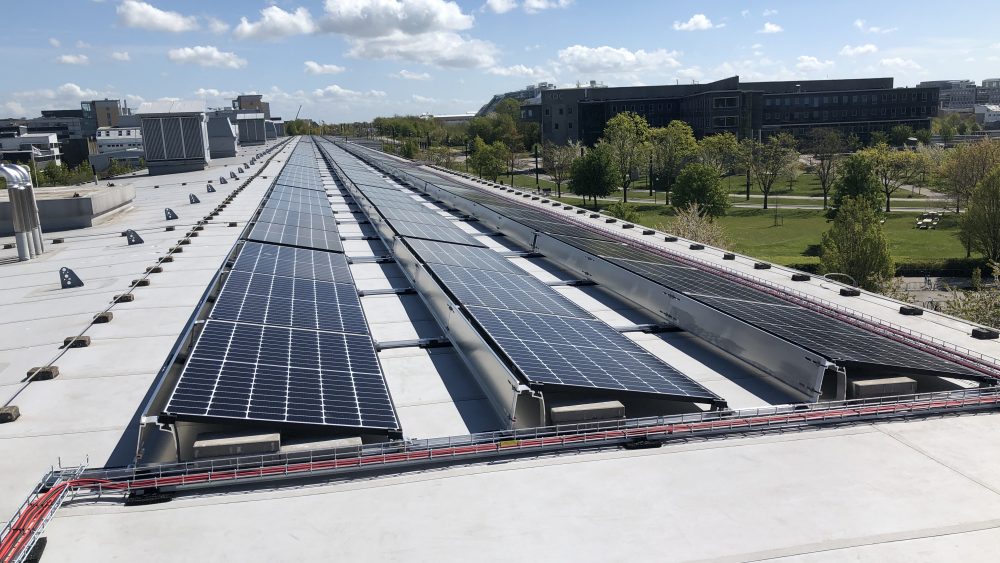
Comments